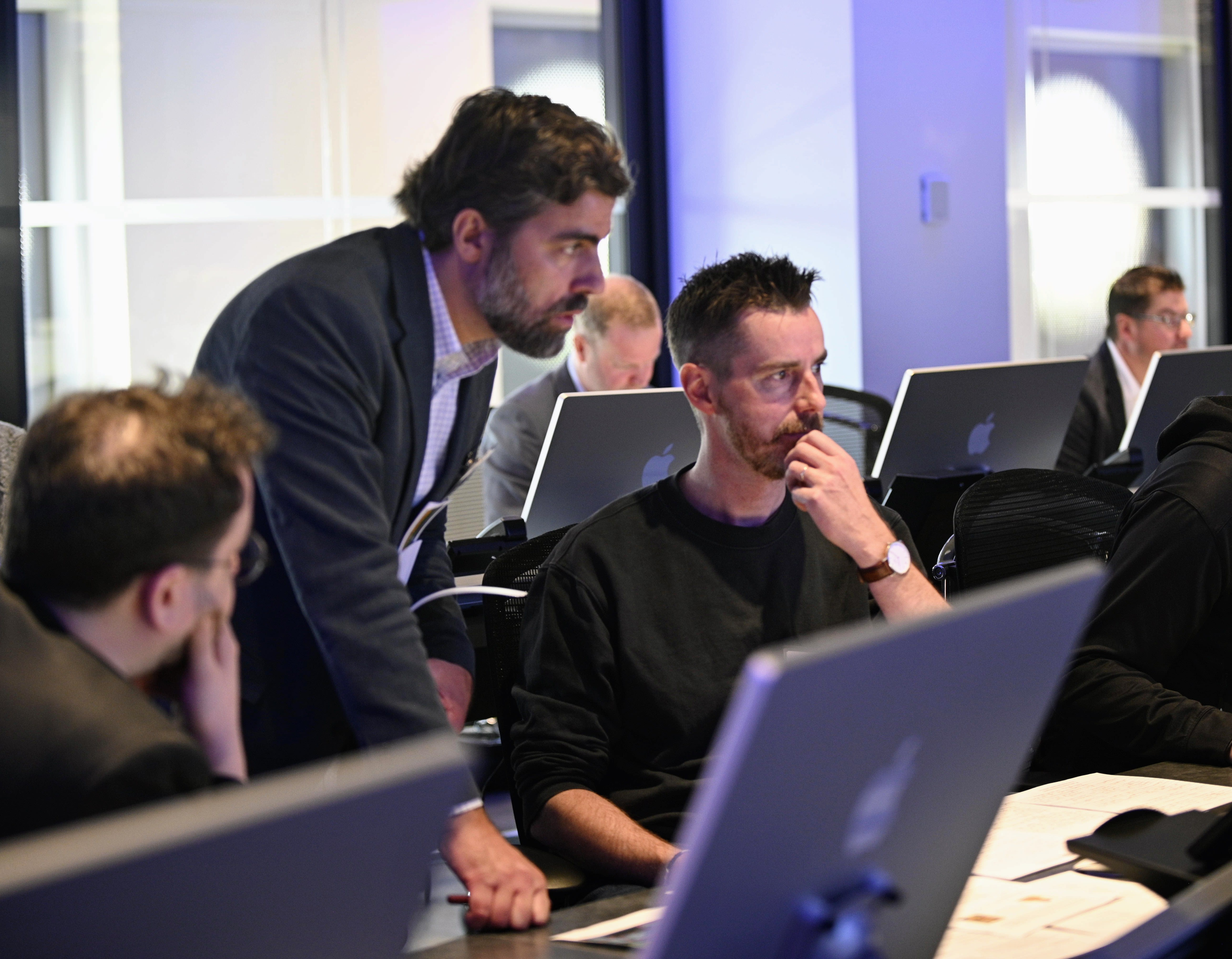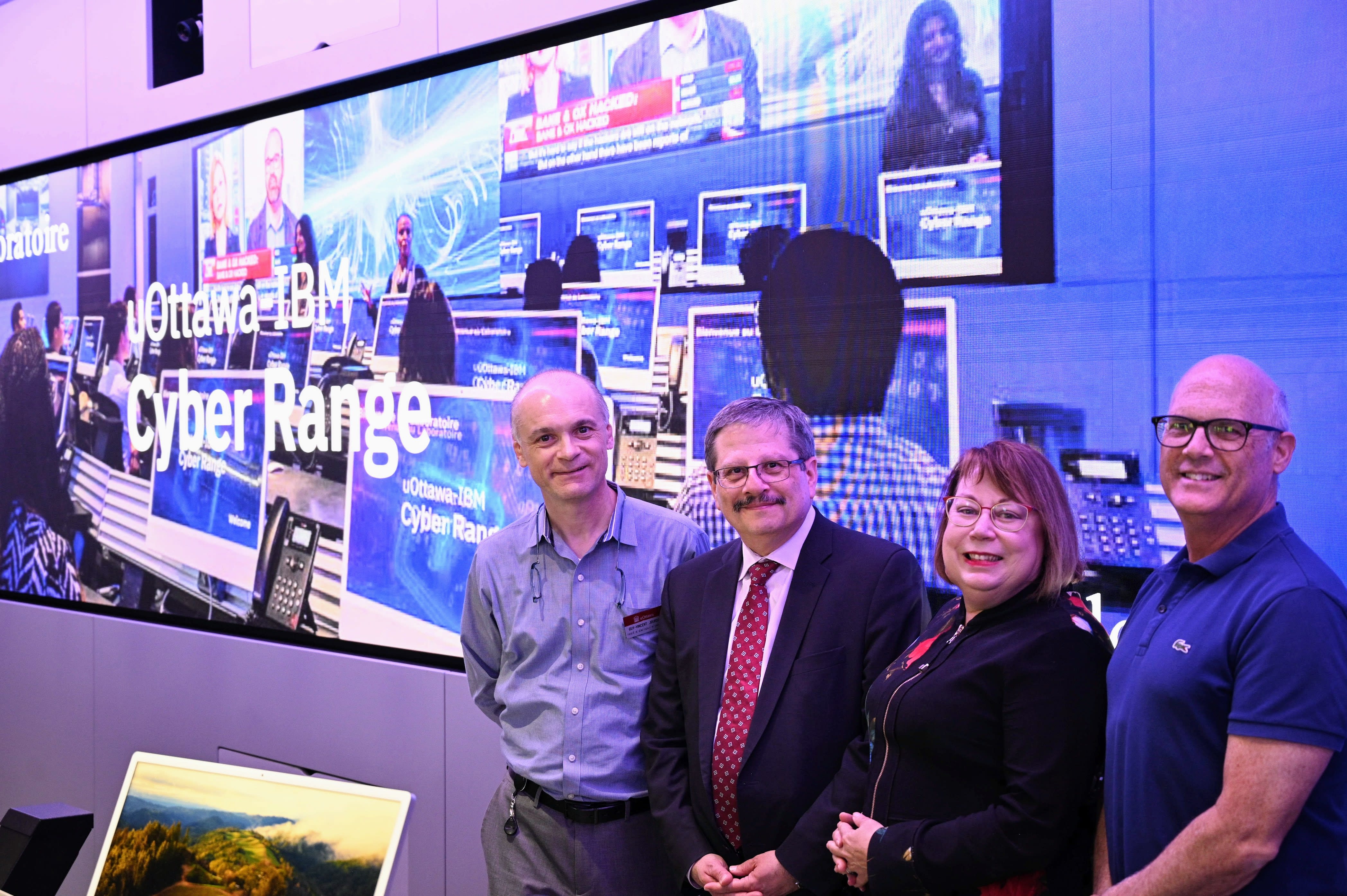What You Need to Know:
Participants in the Executive Security & Intelligence Leadership Certificate (ESILC) took part in the very first cyberattack simulation at the uOttawa-IBM Cyber Range, developed by Telfer Executive Programs and the Faculty of Engineering.
Telfer Executive Programs and the Faculty of Engineering offer the simulation at the uOttawa-IBM Cyber Range as a group training for up to 26 of your organization’s leaders.
The next cohort of ESILC starts in January 2025 – register by December 14, 2024.
When it comes to complex cybersecurity threats, traditional learning methods don’t always impart the lessons that executives need to lead through crisis. On May 9th, the Telfer Executive Programs and Faculty of Engineering teams ran their first cyberattack simulation at the uOttawa-IBM Cyber Range for participants in the Executive Security & Intelligence Leadership Certificate (ESILC). This hands-on simulation prepares leaders for relevant challenges they will face in securing their organization’s critical infrastructure from cyber threats. How did this all come together? I had the opportunity to watch the simulation unfold to learn how this unique experience is helping leaders tackle the crises of the future.

At 7 a.m., the uOttawa-IBM Cyber Range was calm. The documents were ready, the stage was set, and the simulation team was ready to begin an exciting day. As the participants trickled into the space, they took their seats and started to read through their simulation roles. The space began to buzz with anticipation. Guy-Vincent Jourdan, Faculty of Engineering professor and Director of the uOttawa-IBM Cyber Range, welcomed the participants to the space. Guy-Vincent was proud to introduce participants to the unique, fully immersive Cyber Range space they had access to for the day. James Clemens, co-Program Director of ESILC, shared a briefing on the crisis facing the group, and the simulation kicked into high gear. 26 participants representing seven government agencies of the fictional nation of Zelonia came together to form the Cyber Event Response Team.
The morning unfolded as the participants split up to tackle the simulated cyberattack from leadership, technical, operational, and reputational angles. Over the course of the simulation, the participants dealt with the ever-changing crisis through communication, information sharing, and collaboration. Participants excitedly jumped into each event of the simulation, eager to work on solving the crisis and managing its impact both on the citizens of Zelonia as well as Zelonia’s international reputation. Each team completed critical activities, unencrypted vital information, interacted with outside actors via video messages and phone calls, conducted live press interviews, responded to social media misinformation, and made high-pressure decisions to bring the crisis closer to its resolution.
James Clemens, co-Program Director of ESILC, shared that “…when you deliver a simulation like this, there are so many things that you just can't predict. One of those is how participants will engage with the simulation itself. And of course, how they engage with the simulation will determine the direction it takes and how successful you will be at achieving your learning objectives. A lot of the day’s success was because of how quickly and seriously participants engaged with and executed their roles. It’s a fast-paced experience and they had to make decisions quickly. The level of collaboration and information sharing in multiple directions was quite striking.”
Participants celebrated at the end of the morning as they successfully resolved the crisis and fulfilled all their simulation objectives.

“Participants stressed that this experience honed their ability to lead and communicate in crises situations while bringing out the need for preparation, effective communications and collaboration skills and the ability to make decisions in evolving situations,” shared Jennifer Irish, co-Program Director of ESILC. “In addition to these essential leadership lessons, many are taking back to their workplace ideas for developing effective emergency response and business continuity plans with well-defined roles and responsibilities that can be readily operationalized in a crisis.”
The day concluded with an exciting talk by Sami Khoury, Head of the Canadian Centre for Cyber Security (the Cyber Centre). Mr. Khoury shared a wide array of insights about how the Cyber Centre supports organizations from the public and private sectors in creating secure, resilient leaders and systems to keep critical infrastructure protected from threats.
Reflecting on the day, Professor Guy-Vincent Jourdan shared that “Today was an ideal setup for our first simulation, thanks to the ESILC participants, who are an exceptionally skilled and highly motivated group of professionals. They fully embraced the exercise and made it a resounding success.”

As the participants left for the day, they shared with the team their appreciation for and enjoyment of the simulation. “I was super impressed with the quality of the exercise that had obviously been thought through to a very, very large extent,” Andy Cook from Transport Canada reflected. “The timings of the events were perfect, and I thought the video production was fantastic. It really added to the realism of the exercise. I think my biggest take away from today is to try to be a leader in any way you can. In a scenario like this, try to be as comfortable with what you don't know as what you do know.”
Ready to invest in yourself or your leaders in preparing for the threats of tomorrow? Telfer Executive Programs and the Faculty of Engineering offer this simulation at the uOttawa-IBM Cyber Range as a group training for up to 26 of your organization’s leaders. Additionally, the Executive Security & Intelligence Leadership Certificate (ESILC) includes the simulation for all participants as part of their leadership development journey.
Telfer Executive Programs is part of the Telfer School of Management at the University of Ottawa and is focused on delivering over 30 high-impact, innovative leadership development programs and workshops for executives and senior leaders in its client and partner organizations. Telfer clients and partners consist of organizations in the public, private and not-for-profit sectors in the National Capital Region, across the country and internationally.











